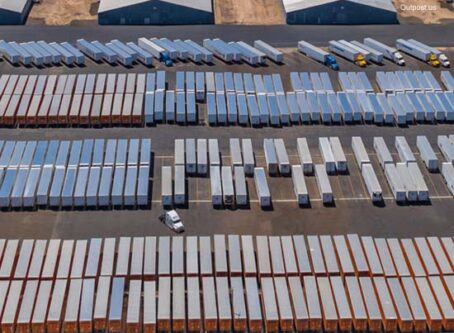Waabi banks $200M in funding, setting the stage for 2025 deployment of driverless trucks
Waabi will be joining the ranks of autonomous truck companies Kodiak Robotics and Aurora Innovation in deploying fully driverless trucks in the United States.
On Tuesday, June 18, driverless truck technology company Waabi announced that it has raised $200 million in Series B funding from some heavy hitters in the tech and automotive industries. The company said this injection of money will allow it to deploy fully driverless trucks powered by generative AI in 2025.
For comparison, rival company Kodiak secured $125 million in Series B funding in 2021, three years after it started. Aurora raised more than half a billion dollars in Series B funding in 2019, just two years after it launched. But unlike Kodiak and Waabi, Aurora’s technology has been integrated into both passenger and commercial vehicles.
One of the newest driverless truck companies, Waabi is generating a lot of interest. The latest round of funding is being led by Uber and Khosla Ventures, the latter of which has invested in big-name tech companies like DoorDash, Instacart and OpenAI. Other notable investors include NVIDIA, Volvo, Porsche, Scania and an investment firm created by IKEA’s founder.
Although Waabi got started several years later than Kodiak and Aurora, it is already catching up to their driverless truck technology. The company attributes its rapid pace to the use of generative AI.
Driverless truck companies have been refining their technology by logging millions of miles on the road. The more miles driven, the more data the technology has to adapt to a variety of situations drivers experience. Although a popular approach to improving autonomous technology, it is also costly and time-consuming.
Despite not having as many miles under its belt, Waabi claims its driverless truck system is nearly ready for deployment. The company says its AI system is “capable of human-like reasoning, enabling it to generalize to any situation that might happen on the road, including those it has never seen before.” Waabi claims the system requires significantly less training data and “reduces the need for extensive on-road testing.”
“I have spent most of my professional life dedicated to inventing new AI technologies that can deliver on the enormous potential of AI in the physical world in a provably safe and scalable way,” Waabi Founder and CEO Raquel Urtasun said in a statement.
Waabi anticipates deploying fully driverless trucks in Texas sometime next year. In April, Waabi signed a multi-year lease on an autonomous trucking terminal near Dallas. Last year, the company began hauling autonomous loads with Uber Freight between Dallas and Houston.
Safety concerns with autonomous vehicles
While Urtasun claims her driverless truck AI system is “provably safe,” stakeholders and federal lawmakers are wary of autonomous vehicles.
In April, six senators sent a letter to the National Highway Traffic Safety Administration urging the agency “to take more proactive and aggressive action to address the safety concerns of” autonomous vehicles. Pointing to several crashes involving autonomous vehicles, the senators are calling for more federal government oversight of the emerging technology.
“We cannot allow partially automated driving systems and automated driving systems to accelerate the road safety crisis,” the letter states. “NHTSA must take firm control of the wheel and steer manufacturers toward prioritizing safety.”
The autonomous vehicle industry has been welcoming more clarity with government policies. In its State of the AV report, the Autonomous Vehicle Industry Association noted that progress could be expedited with clearer policies at the state and federal levels. In that report, Urtasun cautioned that such policies cannot be too strict.
“As is the case with any emerging technology, new frameworks and guidelines are needed to ensure the safe and responsible deployment of autonomous trucks on our roads,” Urtasun said. “These rules need to be flexible, allowing for experimentation and innovation, while also setting a strong floor for safety.”
Meanwhile, many in the trucking industry remain concerned about the safety of driverless trucks.
Lewie Pugh, executive vice president of the Owner-Operator Independent Drivers Association, worries about the reliability of self-driving technology.
“I think most people continue to be concerned, and rightfully so,” Pugh said. “My Bluetooth on my pickup struggles to connect some days, yet we are expected to believe that semi-trucks traveling 85 mph on a Texas highway, changing lanes and passing other vehicles, will not have a connection issue. Face it: If they do have a connection issue, this isn’t a matter of ‘I can’t answer my phone or play my iTunes.’ This could be a devastating disaster.” LL









